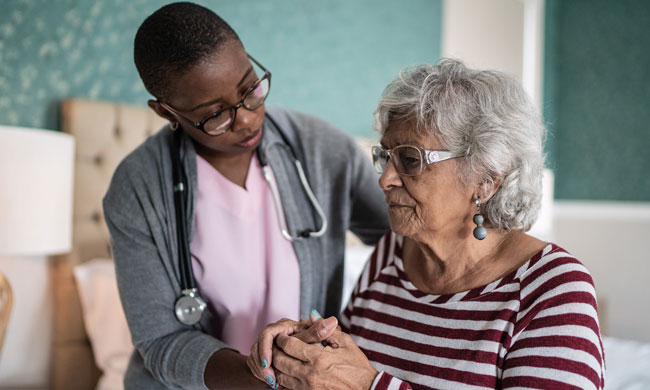HEALTHY LIVING
Caring for older adults: Managing heart attack treatment, follow-up care

(Family Features) As the proportion of older adults in the U.S. continues to increase, appropriate care for older people becomes increasingly important. In fact, caregivers and loved ones should be aware of age-appropriate care for heart attack or chest pain.
The first step is to call 911. Once medical care is started, age-related changes in general health and in the heart and blood vessels require consideration, and likely modifications, in how people age 75 and older are treated, according to a scientific statement from the American Heart Association, published in its flagship, peer-reviewed journal “Circulation.”
The statement, “Management of acute coronary syndrome (ACS) in the older adult population,” highlights evidence to help clinicians better care for older patients. According to the statement, 30-40% of people hospitalized with ACS, which includes heart attack and unstable angina (heart-related chest pain), are age 75 or older.
“Older patients have more pronounced anatomical changes and more severe functional impairment, and they are more likely to have additional health conditions not related to heart disease,” said Abdulla A. Damluji, M.D., Ph.D., FAHA, chair of the scientific statement writing committee, director of the Inova Center of Outcomes Research, and an associate professor of medicine at Johns Hopkins School of Medicine. “These include frailty, other chronic disorders (treated with multiple medications), physical dysfunction, cognitive decline or urinary incontinence.”
Normal Aging and Age-Related Changes in the Heart and Blood Vessels
Cardiovascular changes that occur with normal aging make ACS more likely and may make diagnosing and treating it more complex. These changes include large arteries becoming stiffer, the heart working harder but pumping less effectively, blood vessels becoming less flexible and less able to respond to changes in the heart’s oxygen needs and an increased tendency to form blood clots. Sensory decline due to aging may alter hearing, vision and pain sensations. Kidney function also declines with age, with more than 1/3 of people ages 65 and older having chronic kidney disease.
Multiple Medical Conditions and Medications
As people age, they are often diagnosed with health conditions that may be worsened by ACS or complicate existing ACS. As these chronic conditions are treated, medications prescribed may result in unwanted interactions or medications that treat one condition may worsen another.
“Geriatric syndromes and the complexities of their care may undermine the effectiveness of treatments for ACS, as well as the resiliency of older adults to survive and recover,” Damluji said. “A detailed review of all medications – including supplements and over-the-counter medicines – is essential, ideally in consultation with a pharmacist who has geriatric expertise.”
Steps for Heart Attack Care and Follow-Up for Older Adults
- Call 911 if you notice someone experiencing heart attack warning signs. These include chest discomfort, discomfort in other areas of the upper body (one or both arms, back, neck, jaw or stomach), shortness of breath or other symptoms such as a cold sweat, nausea or lightheadedness.
- Consider treatment needs for co-existing conditions. An individualized, patient-centered approach is best for older adults.
- Get input from multiple specialists, including a pharmacist, to manage care and medications.
- People with cognitive difficulties and limited mobility may benefit from a simplified medication schedule, with fewer doses per day and 90-day supplies of medications so fewer refills are necessary.
- The goals of care for older people with ACS should extend beyond clinical outcomes and focus on quality of life and the ability to live independently.
- Do-not-resuscitate orders should be discussed before any surgery or procedure.
For more information about managing ACS in older adults, visit Heart.org.
Photo courtesy of Getty Images
SOURCE:
American Heart Association
HEALTHY LIVING
Tips for older adults and caregivers this holiday season

(Family Features) The holidays are coming up, and many people will be celebrating with family and friends. The start of colder months also means flu, COVID-19 and RSV can surge. That can be dangerous for older adults.
“Holidays are a time to gather with family and friends,” said Charlene Wong, MD, MSHP, senior advisor for health strategy at the Centers for Disease Control and Prevention (CDC), “but for older people, this can come with risk of serious respiratory illness. Get your updated flu, COVID-19 and RSV vaccines to reduce your risk and do more together.”
Before heading to holiday gatherings, check out these tips from the Risk Less. Do More. vaccine education campaign. They can help you and your older loved ones enjoy a happy holiday season while lowering the risk of serious illness from flu, COVID-19 and RSV.
Get Vaccinated Against Respiratory Illnesses
Older adults are at higher risk of getting seriously ill, ending up in the hospital or dying from flu, COVID-19 or RSV. Vaccines are the best protection against severe disease from these common respiratory illnesses. The CDC recommends that all adults ages 65 and older get the updated flu and COVID-19 vaccines. An RSV vaccine is also available to help protect older people from severe RSV. It is recommended for all people 75 and older, and for those ages 60-74 with certain health conditions, like heart or lung disease or diabetes, or who live in a nursing home. If you are a caregiver or help an older adult with their medical decisions, encourage them to talk to their doctor about the vaccines that are right for them.
Gather Safely
Respiratory illnesses often thrive in indoor spaces where people are in close contact. If the weather permits, try hosting holiday gatherings outside. When gatherings are inside, think about keeping windows open or using fans for ventilation. If you are going to a large indoor gathering, consider wearing a mask. Washing your hands frequently, or using hand sanitizer, also helps reduce the spread of germs. Encourage your older loved ones to take these precautions as well.
Stay Home If You’re Sick
No one wants to miss out on festivities, but it’s important to stay home if you are not feeling well. Encourage your family and friends to do the same. Remind them about the impact flu, COVID-19 and RSV can have, especially on older adults. If you’re a caregiver of an older adult, monitor any respiratory symptoms that may develop. Testing for flu and COVID-19 can also help inform your plans. All U.S. households can now receive four free COVID tests. Order them for your family and your loved ones at COVIDTests.gov.
For many older people, the fall and winter holidays are an important time to connect with others. Be sure to include vaccinations in your holiday planning. Go to vaccines.gov to get started today.
You can also learn more about flu, COVID-19 and RSV at cdc.gov/RiskLessDoMore or by talking to your doctor about which vaccines are right for you this season.
Photo courtesy of Shutterstock
SOURCE:
United States Department of Health and Human Services
HEALTHY LIVING
How to get free vaccines for flu, COVID-19 and RSV

(Family Features) Respiratory viruses are common in the fall and winter months. Flu, COVID-19 and RSV can surge during the cooler weather and keep people from gathering with family and friends. They cause many people to get very sick or even to be hospitalized.
“We know that getting vaccinated is the best defense against severe illness and death caused by flu, COVID-19 and RSV,” said Nirav D. Shah, MD, JD, principal deputy director of the U.S. Centers for Disease Control and Prevention. “Respiratory virus season is here and now is the time to get your updated vaccines so you can focus on what matters most: spending quality time with friends and family.”
Vaccines help people risk less serious illness, so they can do more of what they enjoy. Everyone 6 months old and older should get this season’s flu and COVID-19 vaccines. Adults ages 75 and older, adults 60-74 years old who have certain health conditions and adults age 60 and older who live in nursing homes should get an RSV vaccine if they have never been vaccinated against RSV. Pregnant people should also get an RSV vaccine to protect their babies from severe RSV disease in their first six months.
Getting vaccinated can be easy, and in many cases, it’s free. Here’s what you need to know.
Where Can You Get Vaccinated?
There are many places to get vaccines against flu and COVID-19, as well as RSV if you’re eligible. It’s OK to get all of these vaccines in one visit.
You can get vaccinated at some doctor’s offices, local health centers or most pharmacies. To find pharmacies near you, visit vaccines.gov. Your state or local health department may also be able to tell you where you can get vaccinated in your area.
Are the Vaccines Free?
If you have insurance: If you’re covered by Medicaid, or if you qualify for it, you can get the vaccines at no cost. People with Medicare (Parts B and D) or Medicare Advantage can also get the vaccines for free.
If you have private insurance through your job or your state’s marketplace, most plans fully cover the flu, COVID-19 and RSV vaccines through in-network doctors.
If you are uninsured: If you don’t have health coverage, your state or local health department or a local community health center may offer the flu, COVID-19 and RSV vaccines at no cost. Companies that make these vaccines may also offer them for free or at a lower cost through their patient assistance programs. Look for information on their websites.
To explore insurance options and affordable health plans, visit HealthCare.gov or see if you can get covered through Medicare or your state’s Medicaid program.
Get Vaccinated Now
Vaccines give you the best protection against getting very sick from flu, COVID-19 and RSV. Getting vaccinated soon means you’ll be ready for upcoming winter gatherings.
Visit cdc.gov/RiskLessDoMore to learn more about the flu, COVID-19 and RSV vaccines. Also, you can order free COVID-19 test kits (four per household) at COVIDTests.gov. Talk to your doctor about which vaccines are right for you or visit vaccines.gov to get started today.
Photos courtesy of Shutterstock
SOURCE:
United States Department of Health and Human Services
HEALTHY LIVING
What you don’t know can hurt: 3 facts about updated COVID-19 vaccines

(Family Features) Four and a half years after the start of the COVID-19 pandemic, people are once again enjoying time with friends and family and doing their favorite things. However, the virus that causes COVID-19 keeps changing, so it’s still important to stay up to date on your vaccinations. Respiratory viruses, including COVID-19, are common during the fall and winter months. That’s why now is a good time to take care of yourself and your loved ones by getting the facts on the updated COVID-19 vaccines.
“As the virus changes, we are learning more and more about how to protect people from COVID-19,” said Namandjé N. Bumpus, Ph.D., principal deputy commissioner at the U.S. Food and Drug Administration (FDA). “Getting the latest COVID-19 vaccine means your protection is as up to date as possible.”
Here is information about this season’s COVID-19 vaccines from the Risk Less. Do More. public education campaign:
Vaccines are the best way to protect yourself and your loved ones from COVID-19. Getting vaccinated against COVID-19 lowers your chances of getting very sick or being hospitalized. Some people who get the vaccines still get sick, but vaccination can make symptoms milder. This is important if you are over age 65 or have certain health conditions. Both can put you at a higher risk for serious or long-lasting health problems, such as Long COVID or even death from COVID-19. If you do get COVID-19, ask your doctor about treatment options to reduce your risk of severe illness.
COVID-19 vaccines are regularly updated to keep up with the changing virus. The COVID-19 vaccines are updated based on the latest variants of the virus. The updated vaccines offer the best protection against the changing virus that causes COVID-19. Getting the latest vaccine boosts your immunity and lowers your risk of severe sickness.
Side effects for COVID-19 vaccines are usually mild and go away on their own in a few days. The most common side effects are soreness or redness at the injection site, headache or body aches, or fever. Severe side effects like anaphylaxis are rare, with about five adverse events per 1 million doses given.
Staying informed and getting this season’s COVID-19 vaccine – and encouraging loved ones to do the same – is one of the best things you can do to protect yourself and others this fall and winter. Knowing the facts about COVID-19 vaccinations can give you peace of mind and support a safer, healthier future for all. For more information, visit cdc.gov/RiskLessDoMore or talk to your doctor.
If you think you have COVID-19, testing can help. All U.S. households are now eligible to receive four free COVID-19 test kits. Order them today at COVIDTests.gov.
The Impact of COVID-19 In Black and Hispanic Communities
For the first two years of the COVID-19 pandemic, people in Black and Hispanic communities were consistently more likely to get COVID-19, need medical or hospital care, and die from COVID-19 than people in other communities. That gap has narrowed over time, but this past summer, Black people were still more likely to be hospitalized for COVID-19 compared to the average across all races and ethnicities combined. Hispanic people had lower than average rates of hospitalization. For everyone, getting the latest COVID-19 vaccine offers the best protection against severe disease and hospitalization.
Photos courtesy of Shutterstock
SOURCE:
United States Department of Health and Human Services
-

 NEWS2 years ago
NEWS2 years ago2 hurt, 1 jailed after shooting incident north of Nocona
-

 NEWS1 year ago
NEWS1 year agoSuspect indicted, jailed in Tia Hutson murder
-

 NEWS2 years ago
NEWS2 years agoSO investigating possible murder/suicide
-

 NEWS2 years ago
NEWS2 years agoWreck takes the life of BHS teen, 16
-

 NEWS1 year ago
NEWS1 year agoMurder unsolved – 1 year later Tia Hutson’s family angry, frustrated with no arrest
-

 NEWS2 years ago
NEWS2 years agoSheriff’s office called out to infant’s death
-

 NEWS2 years ago
NEWS2 years agoBowie Police face three-hour standoff after possible domestic fight
-

 NEWS2 years ago
NEWS2 years agoDriver stopped by a man running into the street, robbed at knifepoint





